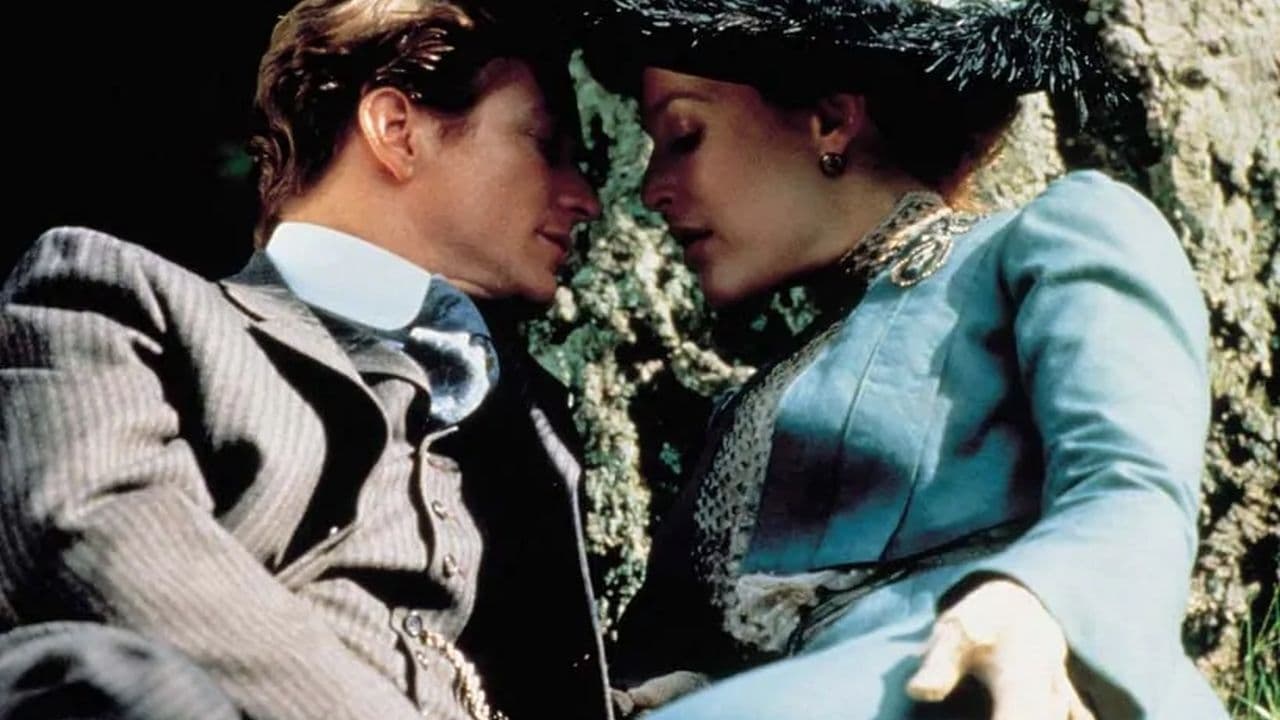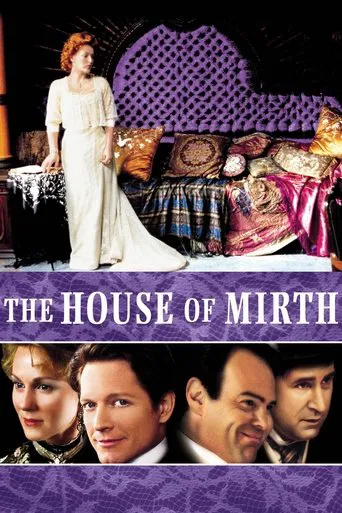

I began to like the classic literature recently. My first language is not English so I did not have the wide knowledge of English literacy. However, being in this country for more than quarter of a century, I started appreciating the old literature. I saw several adapted films like The Age of Innocence, Pride & Prejudice, The Wings of the Dove, Lady Chatterley's Lover and this one. They are inspiring and worthy of spending time on. One thing appealed to me was the dialogue. You can learn some good English writing from them. People felt bored because they usually did not have actions more than talking, walking and eating in the scenes. The excitements were well hidden in between the lavish conversations and well- planted landscapes. The details of surroundings prelude the story in front of you if you care to look for them. Lily was a tragic figure at her time. She was not equipped to do cruel things to others. She thought to act upon. However, she was never able to bring herself to do it. The dreadful situation to her was over thinking. She also fell in love with a subtle playboy which might be more perilous to her than a flamboyant one. She looked for love in the meantime also the security. The ideal match rarely goes together even nowadays. Nonetheless, we are reluctant to blame her for her own destiny. We might make the same choice as she did just we are living in the different era now. Whatever choice we made present no threaten anymore. On her own account, her lack of knowledge or you may quote ahead of her time thinking caused her dire end. Just like Lawrence told her she did not have that kind of upbringing to become successfully independent. Those views will not be disconcerted in the modern days. But they were detrimental in the turn of the century. I do wish to see Lily and Lawrence would end together like most of Jane Austen's stories. But realistic approach somehow gave me the reflections for a change which I would say is a good thing.
... View MoreCaught this flick at my home Trysons pad last night. He was chilling with his Bea Lawanda at Wendys but wanted to keep his crib legit, be a lot of creepers rolling up in here so I stepped up for my dog.Situation is like this, Lily Bart be a total honey, DA moment she walk on DA screen I be like DAUM GIRL YOU FINE. Problem is honey knows she fine and is a total PLAYAAA!!! First home she meets be my home Lawrence Selden, brutha is like DAUM, Im gonna tap that ass. Lily be playing tho, wont let the brutha get his swag on, she be creeping for a legit brutha not some wannabee porch rat.Dudes heads be turning everywhere, Lily holding out on the broth-as though, waiting for a certified situation so she can get her own pad and not have to shack up with her Aunt. Her Aunt be nasty ass hoe, no respect and always fronting.Then dis Dude Sim Rosedale try to Holla at Lily. He be all like marry me and sh1t but my girl Lily keeping it real for her man Lawrence Selden. Yeah they be hooking up and sh1t when peeps not looking. I was like WHAAAT!! You go Lily, keeping them homeys guessing. My home Selden not be getting all ubiquitous and sh1t, you know he wants DAT ass. Honeys be playing tho, homeys be treated all Obliquely, it ain't rite.Girls be nasty like you never seen up in this joint.Den this Otha honey Bertha Dorset be all stepping up on Lily, fronting and talking smack in front of Lily with her peeps present. Lily be getting a bad rep. Den another dude, Augustus 'Gus' Trenor, be trying to pimp Lily, he be getting my girl in debt and sh1t, dis guy be creeping. Times be tough for Lily, I feeling ya sister, times tough for homeys all over this joint.Girls be nasty like you never seen up in this joint. Bertha be spreading rumors that Lily ain't legit, sh1ts about to get serious. Lily not letting these plays be front, when Lily hear of Bertha rolling with a new posse she be like "No doubt the rabbit always thinks it's fascinating the anaconda " I be like BURRRRNNNNNNNNNN!!! Dtas what you get for fronting Bertha.Den Lilys aunt be all dying and sh1t, ain't leaving no dollars for Lily either. Situation ain't right, pl be talking more smack about Lily too, now Lily out on the street.Homies try to help but Lily ain't fronting, now she going Solo but its ain't easy for a Sista to make it on her own, sh1t be to real out there and Lily don't make it. I was like DAUMMM girl, sister took it all the way, big respect.So DAT about it homeys, time is tough back in De olden days too for a brotha and sister, not one Homies got to tap DAT ass either. SHEEEEEETTTT!!!
... View MoreThis Terence Davies emotive period drama could be a sterling double-bill with THE GREAT GATSBY (2013, 8/10), which is the penultimate film I have watched. Last year I hold my underwhelmed apathy towards Davies' THE DEEP BLUE SEA (2011, 6/10), my first Davies film entry, but a closer DVD viewing of THE HOUSE OF MIRTH greatly galvanizes my affinity to Edith Wharton's convoluted story of a woman's inept battle with the hypocrites and the iniquitous of the well-heeled echelon near the beginning of 20th century in New York, it is the dramatic demise of an unsullied soul, there is no mirth at all. Anderson's Lily, an ill-fitted maiden of upper class, sustained by her wealthy aunt Julia's (a ghastly Bron) charity, balks between her passionate desire with a lower class lawyer Lawrence (Stoltz) and her promising marriage with an upstart Sim (LaPaglia), to whom she has no feelings at all, meanwhile a bad investment or a guileless trust to the wrong man (Aykroyd) corners her into a financial predicament, which subsequently creates discord between her and Julia and eventually will cost her the endowment of the inheritance. That's not enough, she is also manipulated to be the pull-upon by her friend Bertha (Linney), while the most excruciating fact is that Lily has the substantial evidence to give Bertha the tit-for-tat, but she can never make up her mind to do it (out of self-respect or the dread of destroying Lawrence's reputation since he is the other partaker in the affair). So Lily is a woman of dignity, even when she is utterly at the end of her tether (she has to take a menial job to earn a living, which she will be dismissed for her incompetence), she refuses to take Sim's succor, her ill-fated life succumbs to a plaintive dirge of an irreversible tragedy.Davies conducts the film adeptly with elegant costumes, shady light compositions, the interior murkiness augurs the dark-amber and midnight-blue tinctures in THE DEEP BLUE SEA, grants melancholy its most suffocating ambiance to submerge audiences' compassion, the score of classical orchestra makes the story even more poignant. The film is also a victory for its cast, Gillian Anderson (I have never watched the X-FILE series and its movie spinoffs), under the bridle of the corset, most of her time her breath is visibly confined into an asphyxiated discomfort just like her character's situation, performance-wise, it may be her once-of-a-lifetime glory, carries out the emotional roller coaster throughout, shamefully it is less acknowledged. Eric Stolz, whose tender tune undergirds his man-child debonair, shows his best form as the man who fails to save his beloved woman. Laura Linney, pretty much nails the virulence and slyness in this less-known work. Jodhi May is great in turning on the waterworks but her character overall has been skated over. Admittedly I have a predilection towards period dramas, and I may miss out some literal undertones of the proficiently organized conversations by Wharton and the dramaturge (Davies himself), but the film is so close in my top 10 list in such a strong year.
... View MoreThe local cinematheque screened a few weeks ago the 2000 adaptation of Edit Wharton's now classic novel The House of Mirth, whose first screen adaptation to screen dates back from 1918.The House of Mirth is a combination of a social and personal drama the story of the descent of a young woman from high class into poverty, of the price to be paid for keeping the dignity in a society that seems to define rigidly the place and track in life of each human being according to their birth, their place in the social hierarchy, their sex, and their material fortune. The American society at the beginning of the 20th century does not seem to resemble too much to the land of all opportunities described in many other literary or cinematographic works. Lily Bart, the apparently apparently frivolous character who stays in the center of the action is smart and beautiful, apparently high in the social hierarchy but too poor to be allowed to make her own choices and play a different role than the one of the well-married girl, or of the woman supported by rich and powerful men. Her refuse to surrender to the social pressure ends in catastrophic results.12 years only after it was made Terence Davies' film looks much older than it's age. A team of TV stars from the 80s (Eric Stolz), 90s (Gilian Anderson) and 2000s (Anthony LaPaglia) do more than a decent job, but I felt like the adaptation to screen borrowed some of the stiffness of the social environment described in the story. More passion, more nuances in the relationship between the characters would have made this film more interesting. Gilian Anderson is a great actress but her discrete acting seems pushed one step too far, her breaking down comes too late to give meaning to her self-sacrifice. This too academic version to screen is interesting mostly for the fans of the social historical American dramas. Which is kind of a paradox as the novel was at its time an exercise in contemporary prose. But this is also history.
... View More